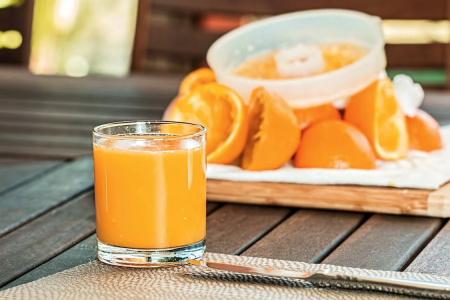You thought fruit juice was the healthy choice—turns out, it could be doing serious damage
By
Maan
- Replies 12
Many of us start our mornings with habits we believe are healthy—but what if one of them is quietly doing more harm than good?
A new study has cast doubt on a common breakfast choice, prompting renewed debate about how we consume sugar.
The findings could have far-reaching implications for how we think about nutrition and long-term health.
Many people believe a glass of orange juice at breakfast is a healthy way to start the day—but new research suggested it could be doing more harm than good.
Researchers at Brigham Young University (BYU) found that drinking sugar, whether from soft drinks or fruit juice, increased the risk of developing type 2 diabetes more than eating sugar from whole foods.
The team reviewed data from over 800,000 adults across North America, Europe, Asia and Australia, combining the results of 29 cohort studies.
They examined links between various sugar sources—including total, added, free, fructose, and sucrose—and the risk of type 2 diabetes.
The study also compared outcomes from drinking sugary beverages such as soft drinks, energy drinks and fruit juice.
Dr Karen Della Corte, lead author and BYU nutritional science professor, said: ‘This is the first study to draw clear dose-response relationships between different sugar sources and type 2 diabetes risk.’
She added: ‘It highlights why drinking your sugar, whether from soda or juice is more problematic for health than eating it.’
The analysis revealed that each additional 8-ounce serving of fruit juice per day raised a person’s risk of type 2 diabetes by 5 per cent.
A daily 12-ounce serving of soft drinks, energy drinks or sports drinks raised the risk by 25 per cent.
A single 8-ounce glass of orange juice typically contains between 18 and 21 grams of sugar—close to a woman’s recommended daily limit.
According to the American Heart Association, men should limit sugar intake to 36 grams per day, while women should not exceed 25 grams.
Fruit juice, despite being marketed as healthy, often contained added sugars and lacked fibre found in whole fruits.
Without fibre, juice caused a quicker spike in blood sugar and affected how the liver metabolised sugar.
This could result in fat building up in the liver and pancreas, contributing to inflammation and insulin resistance.
Over time, these effects could pave the way for type 2 diabetes, which affected over 37 million American adults.
The condition was caused by either insufficient insulin production or the body not using insulin properly.
High blood sugar levels could lead to serious complications, including damage to the kidneys, nerves, heart and eyes.
The study also noted that whole fruits and natural sweeteners like honey did not carry the same risk.
In some cases, these foods were linked to a lower risk of developing type 2 diabetes.
Commercial juices, however, were stripped of fibre and antioxidants during production to improve texture and taste.
Experts had long advised people to eat whole fruits rather than drink juice due to the benefits of fibre for digestion and blood sugar regulation.
Dr Della Corte said: ‘This study underscores the need for even more stringent recommendations for liquid sugars such as those in sugar-sweetened beverages and fruit juice, as they appear to harmfully associate with metabolic health.’
She continued: ‘Rather than condemning all added sugars, future dietary guidelines might consider the differential effects of sugar based on its source and form.’
The study was published in Advances in Nutrition in May 2025.
In a previous story, one Australian woman took her love for fruit juice to an extreme by drinking nothing but orange juice for 40 days.
Her experience offered a very different perspective on the health impacts of juice.
You can read her remarkable journey and reflections by clicking here.

With orange juice under scrutiny, will you be rethinking your breakfast habits? Let us know your thoughts in the comments.
A new study has cast doubt on a common breakfast choice, prompting renewed debate about how we consume sugar.
The findings could have far-reaching implications for how we think about nutrition and long-term health.
Many people believe a glass of orange juice at breakfast is a healthy way to start the day—but new research suggested it could be doing more harm than good.
Researchers at Brigham Young University (BYU) found that drinking sugar, whether from soft drinks or fruit juice, increased the risk of developing type 2 diabetes more than eating sugar from whole foods.
The team reviewed data from over 800,000 adults across North America, Europe, Asia and Australia, combining the results of 29 cohort studies.
They examined links between various sugar sources—including total, added, free, fructose, and sucrose—and the risk of type 2 diabetes.
The study also compared outcomes from drinking sugary beverages such as soft drinks, energy drinks and fruit juice.
Dr Karen Della Corte, lead author and BYU nutritional science professor, said: ‘This is the first study to draw clear dose-response relationships between different sugar sources and type 2 diabetes risk.’
She added: ‘It highlights why drinking your sugar, whether from soda or juice is more problematic for health than eating it.’
The analysis revealed that each additional 8-ounce serving of fruit juice per day raised a person’s risk of type 2 diabetes by 5 per cent.
A daily 12-ounce serving of soft drinks, energy drinks or sports drinks raised the risk by 25 per cent.
A single 8-ounce glass of orange juice typically contains between 18 and 21 grams of sugar—close to a woman’s recommended daily limit.
According to the American Heart Association, men should limit sugar intake to 36 grams per day, while women should not exceed 25 grams.
Fruit juice, despite being marketed as healthy, often contained added sugars and lacked fibre found in whole fruits.
Without fibre, juice caused a quicker spike in blood sugar and affected how the liver metabolised sugar.
This could result in fat building up in the liver and pancreas, contributing to inflammation and insulin resistance.
Over time, these effects could pave the way for type 2 diabetes, which affected over 37 million American adults.
The condition was caused by either insufficient insulin production or the body not using insulin properly.
High blood sugar levels could lead to serious complications, including damage to the kidneys, nerves, heart and eyes.
The study also noted that whole fruits and natural sweeteners like honey did not carry the same risk.
In some cases, these foods were linked to a lower risk of developing type 2 diabetes.
Commercial juices, however, were stripped of fibre and antioxidants during production to improve texture and taste.
Experts had long advised people to eat whole fruits rather than drink juice due to the benefits of fibre for digestion and blood sugar regulation.
Dr Della Corte said: ‘This study underscores the need for even more stringent recommendations for liquid sugars such as those in sugar-sweetened beverages and fruit juice, as they appear to harmfully associate with metabolic health.’
She continued: ‘Rather than condemning all added sugars, future dietary guidelines might consider the differential effects of sugar based on its source and form.’
The study was published in Advances in Nutrition in May 2025.
In a previous story, one Australian woman took her love for fruit juice to an extreme by drinking nothing but orange juice for 40 days.
Her experience offered a very different perspective on the health impacts of juice.
You can read her remarkable journey and reflections by clicking here.
Key Takeaways
- Drinking sugar from juice or soft drinks increased the risk of type 2 diabetes more than eating it from whole foods.
- Each extra daily glass of fruit juice raised diabetes risk by 5 per cent, while soft drinks increased it by 25 per cent.
- Fruit juice lacked fibre and caused faster sugar spikes, leading to fat buildup in the liver and pancreas.
- Whole fruits and honey did not show the same risks and were sometimes linked to lower diabetes rates.
With orange juice under scrutiny, will you be rethinking your breakfast habits? Let us know your thoughts in the comments.








